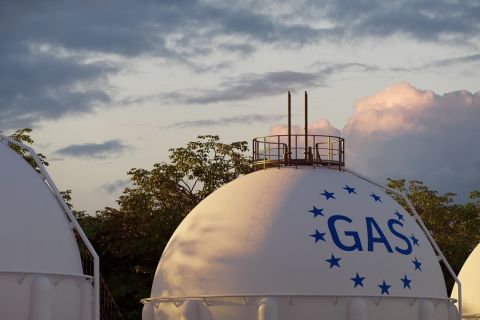U.S. President Joe Biden made clear to Indian Prime Minister Narendra Modi during a virtual meeting on April 11 it was not in India'’ interest to increase its imports of energy from Russia, White House press secretary Jen Psaki said.
Psaki described the meeting as productive and constructive, and not “adversarial.” She declined to say if Biden asked for any specific commitments from India on energy imports.
Biden told Modi the U.S. stood ready to help India diversify its energy imports, Psaki said, noting India’s imports from the United States are already much bigger than their Russian imports.
“The president conveyed very clearly, that it is not in their interest to increase that,” she said.
Daleep Singh, U.S. Deputy National Security Adviser for International Economics, who visited India recently, said prior to Biden’s meeting that the United States will not set any “red line” for India on its energy imports from Russia but does not want to see a “rapid acceleration” in purchases.
Lured by steep discounts following Western sanctions on Russian entities, India has bought at least 13 million barrels of Russian crude oil since the country invaded Ukraine in late February. That compared with some 16 million barrels for the whole of last year, data compiled by Reuters shows.
This meeting will precede the “U.S.-India 2+2 Ministerial” meeting between U.S. Secretary of State Antony Blinken, U.S. Secretary of Defense Lloyd Austin, India External Affairs Minister Subrahmanyam Jaishankar and India Defense Minister Rajnath Singh, the White House said.
Biden, who last spoke to Modi in March, recently said that only India among the Quad group of countries was “somewhat shaky” in acting against Russia over its invasion of Ukraine.
The South Asian nation has tried to balance its ties with Russia and the West but unlike other members of the Quad countries—U.S., Japan and Australia—it has not imposed sanctions on Russia.
Russia has long been India's biggest supplier of defense equipment despite growing purchases from the United States in the past decade. Defense analysts say Russian supplies are more cost competitive and vital for India as it faces a superior Chinese military.
Daleep Singh during his visit said the United States was ready to help India diversify its energy and defense supplies. India is the world’s third-biggest oil importer and consumer.
He also warned that the United States does not want its allies helping resurrect the rouble, which nosedived immediately after the war began but has recovered in recent days.
Ukraine on April 10 said it was seeking another round of EU sanctions against Moscow and more military aid from its allies as it braces for a major Russian offensive in the east of the country.
Russia has failed to take any major cities since it launched its invasion on Feb. 24 but Ukraine says it has been gathering its forces in the east for a major assault and has urged people to flee.
Moscow has rejected accusations of war crimes by Ukraine and Western countries. It has denied targeting civilians in what it calls a “special operation” to demilitarize and “denazify” its southern neighbor. Ukraine and Western nations have dismissed this as a baseless pretext for war.
Biden and Modi were also set to discuss cooperation on a range of issues in their meeting including ending the COVID-19 pandemic, countering the climate crisis, strengthening the global economy, and upholding a free, open, rules-based international order to bolster security, democracy, and prosperity in the Indo-Pacific, Psaki said.
Recommended Reading
Wayangankar: Golden Era for US Natural Gas Storage – Version 2.0
2024-04-19 - While the current resurgence in gas storage is reminiscent of the 2000s —an era that saw ~400 Bcf of storage capacity additions — the market drivers providing the tailwinds today are drastically different from that cycle.
Biden Administration Criticized for Limits to Arctic Oil, Gas Drilling
2024-04-19 - The Bureau of Land Management is limiting new oil and gas leasing in the Arctic and also shut down a road proposal for industrial mining purposes.
SLB’s ChampionX Acquisition Key to Production Recovery Market
2024-04-19 - During a quarterly earnings call, SLB CEO Olivier Le Peuch highlighted the production recovery market as a key part of the company’s growth strategy.
PHX Minerals’ Borrowing Base Reaffirmed
2024-04-19 - PHX Minerals said the company’s credit facility was extended through Sept. 1, 2028.
Exclusive: The Politics, Realities and Benefits of Natural Gas
2024-04-19 - Replacing just 5% of coal-fired power plants with U.S. LNG — even at average methane and greenhouse-gas emissions intensity — could reduce energy sector emissions by 30% globally, says Chris Treanor, PAGE Coalition executive director.





